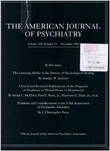Affective spectrum disorder: does antidepressant response identify a family of disorders with a common pathophysiology?
Abstract
Response to pharmacologic treatments may identify groups of disorders with a common pathophysiology. The authors applied a treatment-response model, based on four classes of antidepressants (tricyclic types, monoamine oxidase inhibitors, serotonin uptake inhibitors, and atypical agents), to the medical literature. The model identified eight disorders that may share a pathophysiologic abnormality: major depression, bulimia, panic disorder, obsessive-compulsive disorder, attention deficit disorder with hyperactivity, cataplexy, migraine, and irritable bowel syndrome. Phenomenologic and family studies support this grouping. If the model is validated, this family of disorders, which the authors term "affective spectrum disorder," would represent one of the most prevalent diseases in the population.
Access content
To read the fulltext, please use one of the options below to sign in or purchase access.- Personal login
- Institutional Login
- Sign in via OpenAthens
- Register for access
-
Please login/register if you wish to pair your device and check access availability.
Not a subscriber?
PsychiatryOnline subscription options offer access to the DSM-5 library, books, journals, CME, and patient resources. This all-in-one virtual library provides psychiatrists and mental health professionals with key resources for diagnosis, treatment, research, and professional development.
Need more help? PsychiatryOnline Customer Service may be reached by emailing [email protected] or by calling 800-368-5777 (in the U.S.) or 703-907-7322 (outside the U.S.).



